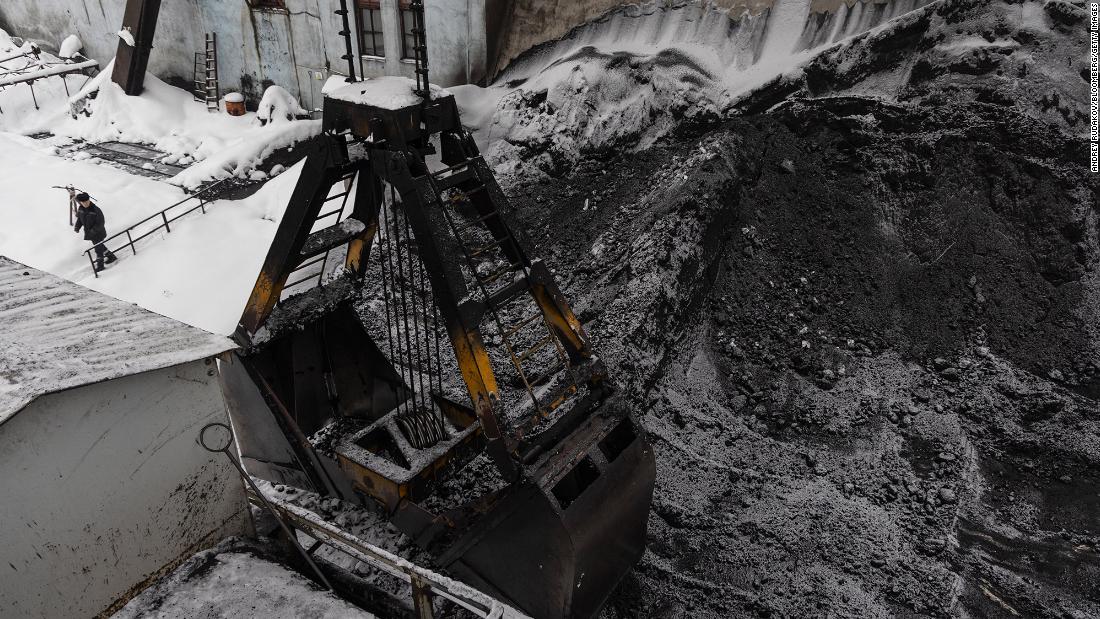
Coal sanctions: Europe is finally coming after Russia’s energy
On Tuesday, the European Commission proposed a ban on €4 billion ($4.3 billion) really worth of Russian coal imports per 12 months as part of a fifth package of sanctions designed to further diminish Russian President Vladimir Putin’s war upper body. Other proposals target Russian know-how and manufacturing imports, truly worth a further €10 billion ($10.9 billion).
Russia’s oil and gasoline could be next. European Fee President Ursula Von der Leyen informed EU lawmakers on Wednesday that the fifth round of sanctions “will not be [the] previous”.
“Indeed, we have now banned coal, but now we have to glance into oil,” she said.
Charles Michel, who chairs conferences of EU leaders, reported in a tweet that “measures on oil, and even gasoline will also be desired quicker or later.”
Much more details of the new package, which include the timeline for the ban on coal, could appear on Wednesday when EU ambassadors meet up with for talks. The measures continue to want the approval of all 27 member states.
Sanctioning coal will bite some European nations, but it’s among the least complicated power resources to wean off — a great deal of the globe is by now doing just that. The trickier question is: What happens subsequent?
How much Russian coal goes to Europe?
The continent received 57 million tons of Russian difficult coal that calendar year, when compared to 31 million tons for China, IEA knowledge reveals. This amounted to extra than fifty percent of Europe’s coal that 12 months, according to Eurostat.
But the EU was by now turning absent from the world’s dirtiest fossil gasoline.
The sum of electrical energy produced by coal has lessened steadily throughout the block in current many years, falling 29{ac23b82de22bd478cde2a3afa9e55fd5f696f5668b46466ac4c8be2ee1b69550} in between 2017 and 2019, in accordance to analysis by power consider tank Ember.
And in spite of a transient uptick final 12 months as gasoline price ranges hit history highs, the IEA anticipates that European desire for coal will resume its continuous decline. Whole imports had been predicted to fall 6{ac23b82de22bd478cde2a3afa9e55fd5f696f5668b46466ac4c8be2ee1b69550} by 2024 even right before Russia’s invasion of Ukraine.
What will a EU ban necessarily mean for coal prices?
Even now, a source crunch — even just one that is phased in — could induce a headache for nations around the world that still use coal for much of their electricity technology, like Poland and Germany.
A fall in offer coupled with rebounding need in China assisted thrust worldwide coal costs up to all-time highs in Oct 2021 — right before slipping again down, for every IEA analysis.
But elevated costs could prove stickier under an EU ban on Russian imports. Rotterdam coal futures, the benchmark for European coal costs, closed at $257 a ton on Monday, but was last found trading at $295, details from the Unbiased Commodity Intelligence Providers showed.
Matthew Jones, direct analyst for EU electrical power and carbon at ICIS, explained to CNN Business that the coal ban will “make an presently tight European supply scenario even tighter and will guide to a scramble to obtain alternate coal resources.”
“Entrance month Rotterdam coal futures traded on the ICE exchange were up almost 15{ac23b82de22bd478cde2a3afa9e55fd5f696f5668b46466ac4c8be2ee1b69550}, and entrance calendar year by 13{ac23b82de22bd478cde2a3afa9e55fd5f696f5668b46466ac4c8be2ee1b69550}, because yesterday’s near in response to the information,” Jones added.
Even so, Henning Gloystein, director of strength, local climate and resources at Eurasia Group, thinks EU states can face up to the shock. The think tank also mentioned on Tuesday that any EU obtain of Australian coal would cushion the blow.
“Sanctioning coal will also make everyday living a great deal a lot more tough for European utilities, which consume a large amount of Russian coal, but electrical power providers can cope with this” Gloystein explained to CNN Business.
What is actually still left to sanction?
Russia’s oil and gasoline materials are notably absent from the hottest round of sanctions. The bloc imported 26{ac23b82de22bd478cde2a3afa9e55fd5f696f5668b46466ac4c8be2ee1b69550} of its crude and 46{ac23b82de22bd478cde2a3afa9e55fd5f696f5668b46466ac4c8be2ee1b69550} of its gasoline from Russia in 2020, according to Eurostat.
But blocking oil imports is on the desk: European Fee President Ursula von der Leyen said in a statement Tuesday that the bloc was “working on added sanctions, which include on oil imports.”
A person state has gone even further. Lithuania’s Primary Minister Ingrida Šimonytė mentioned in a tweet Sunday that “from now and so on, Lithuania will not likely be consuming a cubic cm of harmful Russian gas.” Getting import-reliant nations like Germany and Hungary on board will demonstrate more difficult.
But, in accordance to Gloystein, the bloc’s reluctance to sanction oil and gas is about much more than averting self-harm.
“The EU is keen to be able to continue to keep escalating its response in accordance to developments in Ukraine,” he mentioned. “If Brussels now enforces greatest sanctions, how does it respond to a even more escalation by Moscow?”
Gloystein also explained that targeting Russian oil and gasoline pitfalls backfiring.
“There are really serious and credible concerns that such actions would set off a major escalation by Russia as Putin may sense compelled to act considerably and swiftly in the awareness that his war upper body could before long run dry.”
— Mark Thompson contributed to this report.
